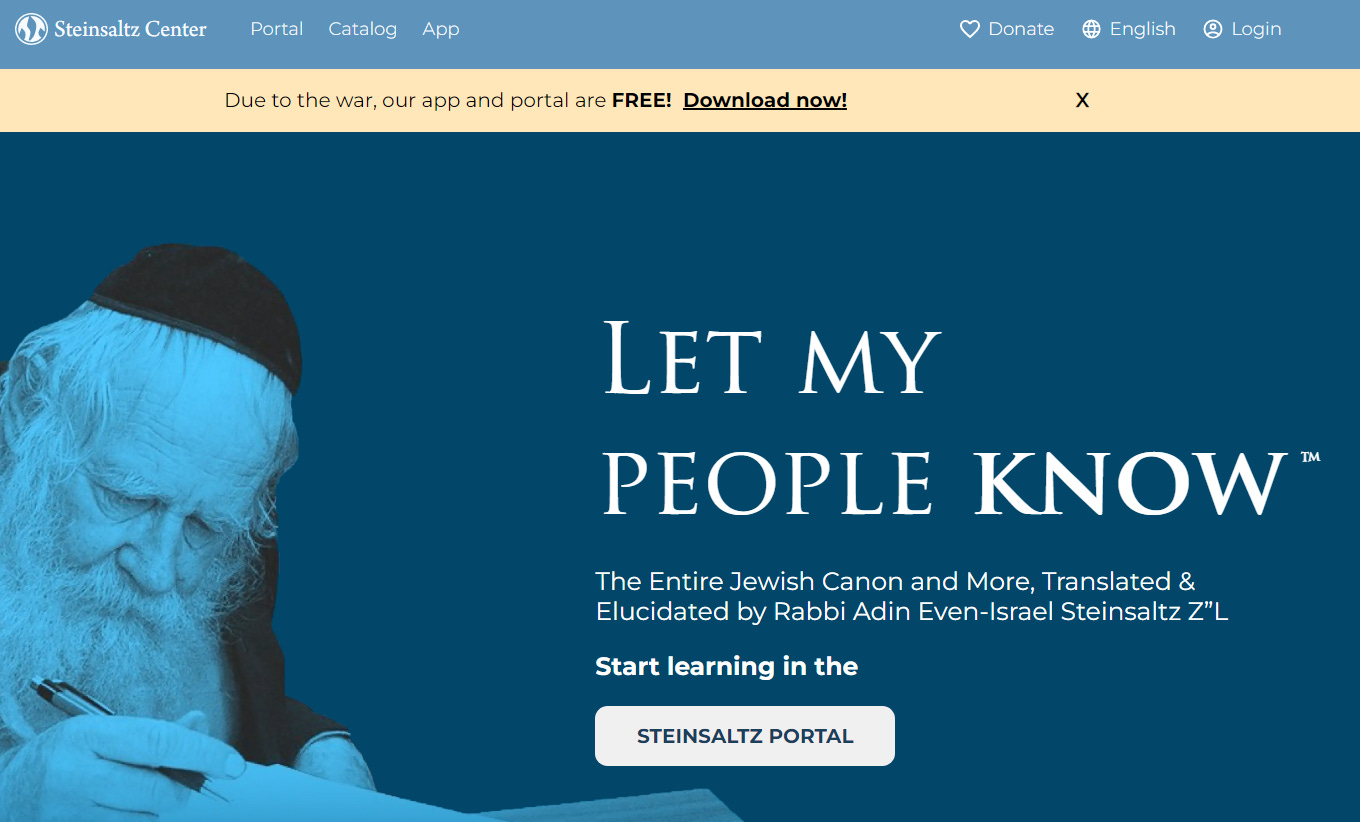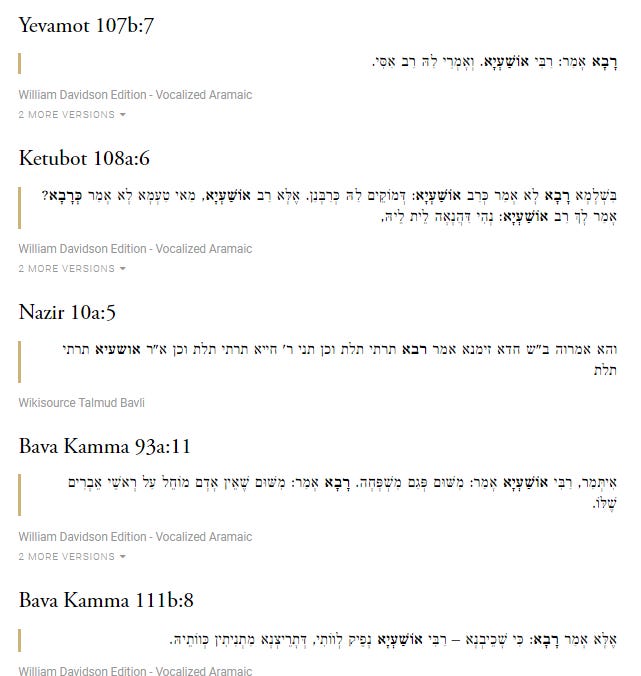Rava and Rabbi Oshaya in Gan Eden
(1) Just an FYI, the Steinsaltz Portal is presently free:
It is good stuff, the material you’d get in the Hebrew Steinsaltz gemaras, but in digital form. I use the print, but if I want to discuss something therein, I’m less likely to do so if it involved scanning, or getting a photo uploaded.
(2) In yesterday’s daf, Bava Metzia 63a, Rava said:
אֶלָּא אָמַר רָבָא: כִּי שָׁכֵיבְנָא רַבִּי אוֹשַׁעְיָא נְפַק לְווֹתִי,
דִּמְתָרַצְנָא מַתְנִיתִין כְּווֹתֵיהּ.
Rather, Rava said another explanation. He prefaced it by commenting: When I die, Rabbi Oshaya will come out from the Garden of Eden to greet me,
as I resolve the mishna in accordance with his opinion, expressed in the baraitot he edited.
How so is elaborated as the gemara proceeds. Rashi makes this a regular thing, of Rava explaining in accordance with Rav Oshaya’s braytot.
דמתרצנא מתניתין כוותיה שאני רגיל לתרץ משניות שסתם רבי כברייתא שסתם הוא ודכוותיה אמר רבא בהגוזל בתרא (ב"ק דף קיא:):
We can see this here:
אֶלָּא אָמַר רָבָא: כִּי שָׁכֵיבְנָא – רַבִּי אוֹשַׁעְיָא נָפֵיק לְווֹתִי, דְּתָרֵיצְנָא מַתְנִיתִין כְּווֹתֵיהּ. דְּתָנֵי רַבִּי אוֹשַׁעְיָא: הַגּוֹזֵל וּמַאֲכִיל אֶת בָּנָיו – פְּטוּרִין מִלְּשַׁלֵּם. הִנִּיחַ לִפְנֵיהֶם – גְּזֵילָה קַיֶּימֶת, חַיָּיבִין; אֵין הַגְּזֵילָה קַיֶּימֶת, פְּטוּרִין. הִנִּיחַ לָהֶם אֲבִיהֶם אַחְרָיוּת נְכָסִים – חַיָּיבִין לְשַׁלֵּם.
Rather, Rava said: When I die, Rabbi Oshaya will come toward me from his place in heaven in order to greet me, as I explain the mishna in accordance with his opinion and thereby honor him. As Rabbi Oshaya taught in a baraita: In a case of one who robs another and feeds the stolen goods to his children, the latter are exempt from paying the owner. If he left a stolen item to them as an inheritance, if the stolen item is extant, the heirs are obligated to return it to the owner; if it is not extant, they are exempt. If their father left them guaranteed property, i.e., land, they are obligated to pay the owner. Rava explains the mishna as being consistent with the baraita of Rabbi Oshaya, although this explanation is not consistent with Rabbi Yehuda HaNasi’s interpretation.
I couldn’t find a third example of Rava using this phrase.
We can look for cooccurrences to see how often these two align.
Berachot is just either Rava or Rav Oshaya, and Rav Oshaya is an Amora, not the quasi Tanni quasi Amora. In Shabbat, he rules like Rabbi Oshaya in a brayta. In Pesachim 39, he defines chazeret which Rabbi Oshaya had promoted. In Pesachmi 113b, again, this is the later Amora under discussion.
In Yevamot, Abaye and Rava are discussing who it is that Rabbi Yochanan disagrees with, according to Ravin, with Rava suggesting it is either Rabbi Oshaya or (in a variant) first generation Rav Asi of Hutzal. In Ketubot, this seems to be the later Amora, arguing with Rava. In Nazir, alongside Rabbi Chiya, it is Rabbi Oshaya. But Rava echoes both of them. In Bava Kamma 93a, it appears to be a disagreement (and we can think that this should be Rav Oshaya, the Amora). In Bava Kamma 111, we’ve seen it already, as Rabbi Oshaya greeting Rava.
Here is the last batch:
Bava Metzia 62 and 63 is our current sugya. Chullin 12 and 13, this is a more complicated person, it is Oshaya the Younger from the Fellowship / Sages.
So, it seems to be a limited throwaway line about explaining like Rabbi Oshaya, that appears in only two sugyot. Unless there are others that just didn’t reach us.







